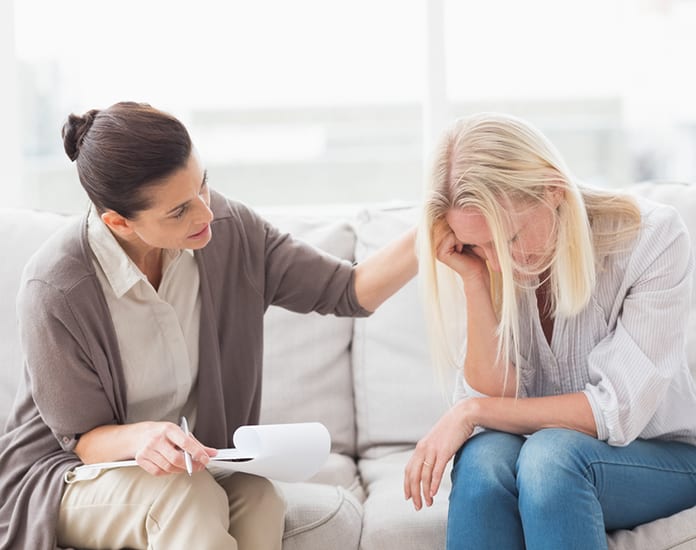
Anxiety is an all-encompassing feeling that can affect anyone at any time. It can be crippling when it’s constant and overwhelming when it’s bad. While anxiety cannot be “cured,” there are many ways to manage the condition and lead a more fulfilling and stable life. So what can you do when anxiety is ruining your relationship? Working on your relationship with anxiety is one of the most important things you can do to improve your mental health.
Many people with anxiety find that their relationships worsen as their symptoms get worse. What’s the worst that could happen, right? You and your partner might not always see eye-to-eye on how to manage your anxiety, but there are things you can do to make things better. Keep reading to discover 9 helpful ways to have a better relationship with anxiety.
Anxiety can really take a toll on your relationships, and not just because you’re constantly worrying so much about what your partner is thinking or feeling. If you and your partner are experiencing anxiety together, it can actually be having a much bigger impact than you realize. Of course, it’s not always easy to recognize the ways in which your anxiety is affecting your relationship.
You may falsely assume that your partner’s issues are only a small part of the bigger picture, or you may feel like you’re the only one going through certain challenges. However, when anxiety is ruining your relationship, there are lots of little things you can do to get back on track.
Contents
Things To Do When Anxiety Is Ruining Your Relationship
1. Stop seeking reassurance
One of the most common things that people with anxiety do is seek reassurance. When you feel your anxiety creeping up, it can be tempting to reach out to your friends and loved ones for help. The problem is that this often leads to a vicious cycle of seeking reassurance, overanalyzing outcomes, and feeling worse about yourself than you did when you started.
The best thing that you can do for yourself and your relationships is to stop seeking reassurance! If you feel like something has gone wrong in your relationship or if you’ve been doing something wrong, try talking it out before reaching out to anyone else.
If you’re constantly seeking reassurance from your partner, it can be really damaging to the relationship. When someone always asks for reassurance it can be seen as a way of controlling that person.
2. Learn to sit with difficult emotions
One of the most important things you can do to combat anxiety and its effect on your relationships is to find a way to sit with difficult emotions. Whether it’s feeling anxious or experiencing sadness, these feelings are valid. Challenge negative thoughts and beliefs that may be contributing to your anxiety. Try to reframe your thoughts in a more positive way.
You don’t have to feel like you need to numb them with food, drugs, or alcohol. Instead, learn how to process them in a healthy way. This will not only help you deal with your anxiety but also help you heal from past trauma that may be contributing to it.
It can be really tough to try to keep going when you’re feeling anxious, but it’s important to remember that the more you learn to sit with your emotions, the less they’ll control you. It might seem like a no-brainer, but the truth is that feeling like things are out of your control is one of the key contributors to anxiety.
The first step in conquering anxiety is learning how to let go and accept what is. Yes, this might feel impossible in the moment — but if you work at it enough and practice patience, you will start to see some results.
3. Always communicate with your partner

Talk openly with your partner about your anxiety and how it affects your relationship. Be honest and specific about your feelings and concerns. Communication is one of the most important things you can do to maintain a healthy relationship with your partner. If you’re feeling anxious, it’s important to communicate that with your romantic partner before it gets out of hand and starts affecting your relationship in a negative way.
If you’re really struggling, consider consulting a psychologist or therapist. They may be able to help you work through your anxiety and determine if there are any underlying causes for it. But until that time, try talking about what caused the anxiety and how you were feeling when it happened. If possible, take steps to ensure it doesn’t happen again in the future.
It is crucial to remember that your partner is there for you. One of the best ways to take back your relationship is by communicating with your partner. When you have anxiety, it can be very easy to feel disconnected from others and find yourself feeling alone.
By communicating with the people in your life, you will be able to learn more about how they are feeling and what they need at that time. If a person does not communicate, their issues can build up until they become too difficult to handle.
4. Take a break from the situation that’s making you anxious
When you feel your anxiety creeping in, the last thing you want to do is stay in that situation. If you find yourself feeling more tense than usual, it might be a sign that you need to take a break and have some alone time.
Give yourself permission to get away from whatever is causing the anxiety so that you can come back to it with fresh eyes.
You need to take a break from the situation that’s making you anxious. It will help you calm down and reassess what’s going on.
5. Practice self-care and mindfulness
Practice mindfulness techniques such as deep breathing, yoga, or meditation. This can help you stay present and focused, and reduce feelings of anxiety. Take care of yourself by practicing self-care techniques such as meditation, exercise, and getting enough sleep. This can help reduce your anxiety levels and improve your overall well-being. One thing you can do to manage your anxiety is to exercise. You might not be able to exercise every day, but if you are, it will help decrease the amount of tension in your body and calm any worries that might be plaguing your mind.
Physical activity also releases endorphins that can help counteract stress and anxiety. The more time you spend on yourself and doing something for yourself, the better.
One of the best ways to manage your anxiety is by exercising. According to WebMD, “exercise can help relieve symptoms of depression and anxiety, improve mood, and promote feelings of self-worth.”
Studies show exercise can also lower anxiety symptoms in people with a generalized anxiety disorder (GAD). Try to exercise for at least 30 minutes every day not only because it will help reduce your anxiety but because it will also have a positive impact on your physical health.
6. Notice that you are not your thoughts but are in control
One of the most important things that you can do to take back your relationships is to notice when you are anxious. Most people think that they are their thoughts or feelings, but this isn’t the case.
You are the one who is noticing these things and you have the ability to choose how you respond. If you feel that anxiety is taking over and getting in the way of your interactions with others, it might be time to step back and get some perspective.
Anxiety can make you feel like you are not in control, so it’s important for you to know that you are. You have the power to change how your anxious thoughts influence your life.
They don’t have to run the show and dictate how you act. With practice, you can learn to notice when anxiety starts talking and refuse to listen. Moreover, set boundaries in your relationship to ensure that you are not compromising your own well-being. Be clear about what you need from your partner to manage your anxiety.
7. Try aromatherapy or acupuncture

Aromatherapy is a great way to soothe your anxiety. You can put pleasant scents in your home or workplace to help relax you when you feel anxious. You can also use aromatherapy oils on your pulse points to gain the benefits of the scents more quickly.
Acupuncture is another relaxation technique that people find helpful for easing their anxiety. It’s a good way to get some stress relief, and it may also calm your anxiety.
If you’re feeling physically tense and anxious, try an aromatherapy or acupuncture session. These activities will help you relax your muscles and focus on something other than the stress in your life. It can also be a great way to meet new people.
8. Journal or find a self-help book or online course that suits you
Apart from the occasional episode, most people don’t go through life with debilitating anxiety. But if you’re suffering from a high level of anxiety then it might be affecting your social life.
In order to get started on the journey to overcoming your anxiety, you’ll need to figure out what’s causing it in the first place. And journaling is a great way to do just that! Jotting down your thoughts and feelings before, during and after an event can help you track what’s going on with your anxiety. You can also find self-help books or online courses that suit you — there are so many resources online for those who struggle with their mental health!
One of the most important things when it comes to dealing with anxiety is finding something that helps you find your own way of coping. You may not have been born with anxiety, but it’s possible that it was brought on by a stressful event.
The problem with this is that there are so many different ways to cope with stress. Therefore, the first thing you should do is try and journal or find a self-help book or an online course that suits you.
9. Learn Cognitive Behavioral Therapy (CBT)
Cognitive-behavioral therapy is a form of psychotherapy that has been proven to be very effective in treating anxiety. It’s important to note that CBT is not just for patients. This type of therapy can also be beneficial to those who are close to an individual suffering from anxiety. There are some great online CBT courses you can take right now, or you can book a session with a therapist if you prefer.
Without a doubt, the most prominent solution for anxiety is cognitive-behavioral therapy (CBT). The idea behind CBT is that our thoughts are the cause of most of our problems. In other words, if you believe something to be true then you will also tend to behave in a certain way.
This type of therapy has proven to be successful in treating people with depression and anxiety because it teaches participants to challenge their negative thought patterns and behaviors.
One of the main goals with CBT is to change your behavior while not changing your beliefs, which can be difficult but totally possible with practice. Consider seeking professional help from a therapist or counselor who specializes in anxiety. They can provide guidance and support to help you manage your anxiety.
10. Find a support network of friends and family members who you can talk to

One of the best ways to start overcoming your anxiety is to find a support network of friends and family members who you can talk to. A lot of people find that their anxiety gets worse when they spend too much time alone, so it’s important to have someone who you can vent to when things are stressful.
Friends and family members are most likely going to be the people who care about you the most in your life, making them an obvious choice for a support system. When you have someone who you can trust with your thoughts and feelings, it’s a lot easier to start letting go of some of that stress and anxiety.
It’s important to have someone in your life who you can turn to when things get tough. If you don’t have a support network of friends and family members, start making some! Sharing your feelings with people who understand what you’re going through is an excellent way to take back your social life.
11. Help break the cycle of anxiety
Anxiety can be a vicious cycle. You get anxious, which triggers a fight-or-flight response in your body, which then sends your heart rate through the roof and leaves you feeling like you’re losing control. The best way to break that cycle is to stay calm.
There are a few techniques that you can use to stop feeling sick from anxiety which can ruin your relationship. Some are easier to implement such as deep breathing exercises while others may take a little bit more effort.
When you feel the physical symptoms of anxiety, try to do something relaxing or soothing. Take deep breaths and focus on your breathing. Try to meditate or listen to calming music to help regulate your heart rate and slow down the panic attack.
The first thing you need to do if anxiety is ruining your relationships is to take gradual steps toward socializing. If you find yourself terrified of even the thought of hanging out with friends, don’t force it — that will only exacerbate your feelings of unease.
Instead, start by going out for a short walk or visiting around the neighborhood. As you grow more confident in your abilities and overcome some of your fears, see how long you can go before turning back around. You may be surprised by how much you can do before feeling frightened again.
Try to understand your partner’s perspective and show empathy toward their feelings. This can help build a stronger connection and improve communication in the relationship.
Finally, focus on the positive aspects of your relationship and express gratitude for your partner’s support and understanding. This can help reduce anxiety and improve overall relationship satisfaction.
13. Identify the root cause of your anxiety:
It is important to understand what triggers your anxiety and how it affects your behavior in the relationship. Identify the root cause of your anxiety and communicate this to your partner.
Identifying the root cause of your anxiety is an important step toward managing it. Anxiety can be caused by many factors, such as past traumas, current stressors, or a genetic predisposition. One way to identify the root cause of your anxiety is to reflect on when it first started and what may have triggered it. It may be helpful to keep a journal to track your thoughts and feelings and identify patterns that contribute to your anxiety. You may also consider talking to a therapist or counselor who can help you identify and work through the root causes of your anxiety.
In addition to reflecting on past experiences, it is important to pay attention to your current situation and how it may be contributing to your anxiety. Are there certain people, places, or activities that trigger your anxiety? Are there specific times of day or situations that make your anxiety worse? By identifying these triggers, you can take steps to avoid them or develop coping strategies to manage them. It may also be helpful to communicate with your partner or loved ones about your triggers and work together to create a supportive environment that helps you manage your anxiety.
How can anxiety ruin my relationship?
Anxiety ruins relationships because it intrudes on and disrupts the natural balance of a social gathering. If you have previously been able to enjoy and participate in group settings, a sudden panic attack can leave you feeling too embarrassed and isolated to return.
The fear of having another panic attack can also make it difficult for you to go out and do things for yourself.
Can anxiety end a relationship?
Yes, anxiety can have a major impact on relationships. If you’re feeling this way, it is important for you to recognize that you are not alone in your struggle.
You can start to overcome your anxiety by using these 12 tips. One tip is to find an outlet for your thoughts and feelings because this will help without harming anyone else.
Anxiety can end a relationship if the other person cannot understand what you’re going through and they may endure the relationship with great anxiety or fear while they’re trying to help themselves heal.
Can anxiety make you want to break up?
One of the most common signs of anxiety is a fear of needing to take care of your own needs. This can make it difficult for you to put your needs first, and it may lead to emotional and physical withdrawal from relationships that are important to you.
When someone with anxiety feels suffocated from their relationships, they may start looking for reasons to break up even when the relationship is very good.
A strong sign of this is when they ask themselves if they’re happy in the relationship. If you find yourself constantly questioning whether or not you should be in a relationship, it might be time to take a step back.
If you feel this way, it’s best if your partner knows about it as well. You both deserve to be on the same page before making any hasty decisions.
What is the 3 3 3 rule for anxiety?
The 3 3 3 rule is a great way to train your brain to focus on what’s happening at the moment. It helps you deal with your anxiety by focusing on things around you.
Thus, you focus on naming three things you can see in your vicinity, naming three sounds you hear, and moving three parts of your body namely the ankle, fingers, or arm.
By asking yourself three questions, you give yourself a chance to take in your surroundings and make an effort to calm down. You might be surprised by how much more you can see when you start being more mindful of your surroundings.
Conclusion
It’s no secret that anxiety strikes fear into the hearts of many. The feeling of dread, panic, and unease that so many people experience on a day-to-day basis is something that we can all relate to. Even the strongest among us can feel the pressure to conform when everyone else is getting along fine.
The problem is, that anxiety doesn’t just make you feel tense — it can also have a serious impact on your relationships. If you’re feeling overwhelmed by anxiety, you’re certainly not alone. In fact, a lot of people are finding that it’s ruining their social lives. But it doesn’t have to be that way! With some effort and a little bit of know-how, you can start to overcome your anxiety and take back your relationships.
These are some of the ways to take care of anxiety:
- Take care of yourself
- Don’t avoid your feelings
- Accept your anxiety for what it is
- Get more sleep
- Talk to other people about your anxiety
- Exercise more often
- Practice mindfulness (i.e., meditation)
- Keep a journal about your feelings and thoughts about anxiety
- Track your progress and be mindful of the changes you can see (or not see) in both your body and mind from these efforts
FAQs
What is anxiety?
Anxiety is when you’re feeling uneasy and worried about a situation in the future or something that has already happened. You may be experiencing some symptoms of stress, like sweaty palms, a racing heart rate, difficulty breathing, or tense muscles.
How can I tell if my anxiety is ruining my relationships?
You might notice that your social life has taken a turn for the worse — you’re feeling more anxious than usual and everything feels more difficult. For example, going out to eat can feel like an awful decision with too many thoughts weighing down on your shoulders and making it hard to enjoy yourself.
Being around friends might make you feel more nervous than usual because you’re always thinking about what could go wrong. Or maybe interacting with new people makes you feel so uncomfortable that it just seems easier to avoid social situations altogether.
Can anxiety make you not love your partner?
If you find that your anxiety is making it difficult to love your partner the way you should, then it’s time to take a look at what’s going on. Anxiety can cause people to neglect their partner’s needs or ignore them altogether. Sometimes, anxiety can even make it hard to speak up about your own needs and desires. This is something that needs to be addressed if your relationship is going to survive the long-term effects of anxiety.
Should I talk to my partner about my relationship anxiety?
Yes, honest discussion about your expectations, fears, worries, or dreams for the future is the first step in making a relationship better when you have relationship anxiety. You don’t have to be afraid to talk about your anxiety with your partner. You may find that they are struggling with similar things but never thought it was worth mentioning.
What are some ways I can cope with my anxiety?
One way to cope with your anxiety is by understanding what triggers it the most and finding alternatives to those triggers or coping mechanisms for them. For example, if certain noises trigger your anxiety and make it worse, then try listening to music or white noise instead of turning off the TV when watching TV at home (this will help keep your mind off the noise). If being around people who have similar interests as yours makes you feel less anxious (you might not have anything in common with strangers), then purposefully seek out these kinds of people as a way to find help.
Image source: https://unsplash.com/